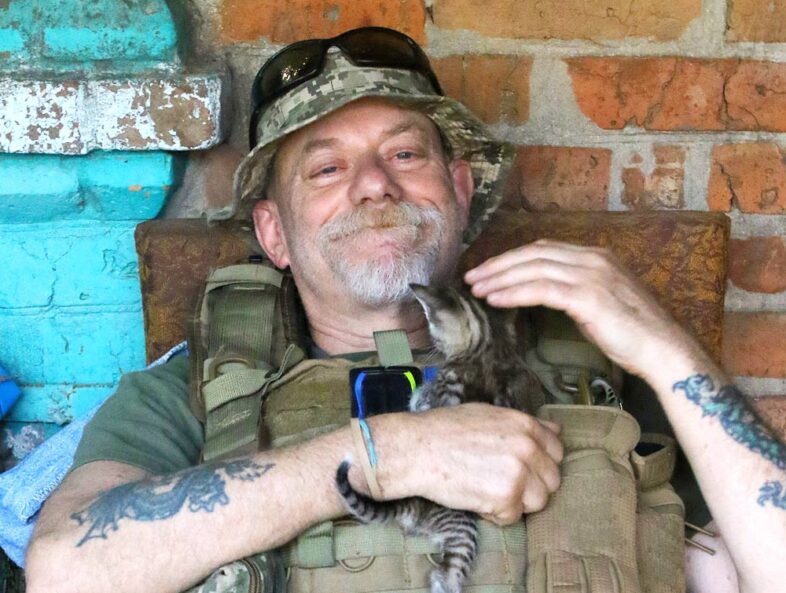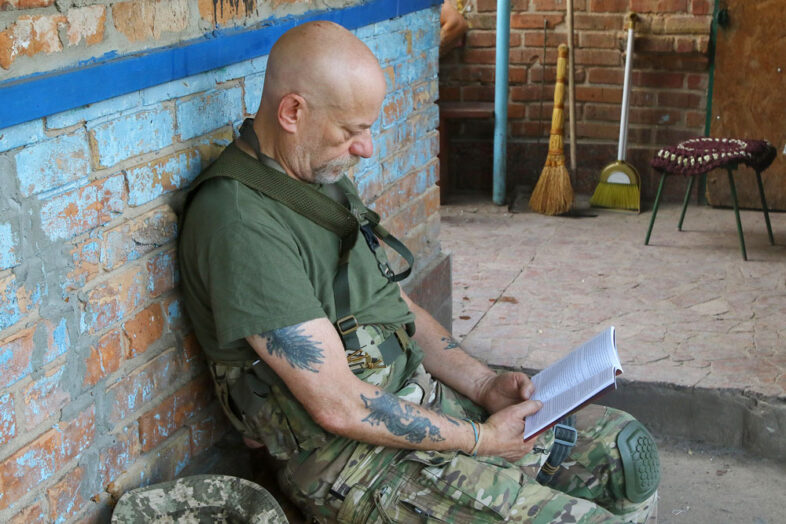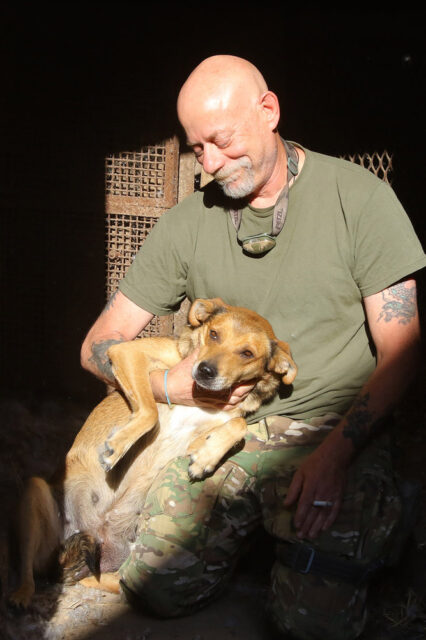Kevin, a military paramedic, has been stationed in Ukraine since the onset of the full-scale Russian invasion. Initially working in the Mykolaiv region, he later spent six months on evacuation missions in Lysychansk, Sievierodonetsk, and Bakhmut. He is now with the Hospitallers, serving with the 3rd Separate Battalion ‘Volyn’ of the Ukrainian Volunteer Army (UVA). Kevin appreciates the UVA for its volunteer-driven spirit, resonating with his own commitment.
In the U.S. Army, Kevin served as a paramedic for nearly a decade. Despite his extensive experience, he acknowledges that the combat situations he has encountered in Ukraine are unprecedented. “I was too young for Vietnam and too old for Iraq and Afghanistan,” he reflects. “This is my first war.”
“When I was younger, drones didn’t exist. Even at the start of this war, when I arrived at a location, I’d look for a small ditch to hide in,” Kevin explains. “Now, my first question is—where’s the nearest tree?”

Photo: Roman Malko
“These days, many foreigners come to Ukraine to share their expertise and teach Ukrainians how to fight,” Kevin says. “But after this war, it will be Ukrainians teaching the world how to combat in the era of drones, how to handle tactical medicine, and more. In the U.S., we have extensive knowledge of tactical medicine, but it’s all based on the assumption of rapid evacuation. Back home, I used to carry a small backpack…”
Kevin produces his old backpack and hands it to me. “For quick evacuations, this is sufficient. But now, with no guarantee of evacuation,” he reveals a much larger backpack, “you need something like this. Even I, as an older man, can carry it,” he smiles. “But if you offer to help, I wouldn’t say no.”
Kevin’s call sign is “Knyzhnyk” (Bookman), a nod not just to his reading habits but to his unique journey. “Initially, I was ‘Doc,'” he recounts. “Then I became ‘Did’ (Grandpa) because I was often the oldest. When I joined the Hospitallers, ‘Grandpa’ was already taken, and ‘Doc’ was common as well. I tried ‘Frenchman’—my mother was French, and I speak the language. But with three ‘Frenchmen’ already, I had to settle on ‘Knyzhnyk.’ It suits me well; I’m the only one with that name, and it’s a tribute to my grandfather, Knyzhnykov.”
Kevin’s grandfather hailed from Bohuslav in the Kyiv region, a scenic area where the Ros River carves through granite cliffs, home to the legendary Marusya Bohuslavka, who, the story is, liberated 700 Ukrainian Cossack prisoners from Turkish captivity. He emigrated to the United States over a century ago before World War I. Despite the distance, Kevin’s family has maintained a strong connection to Ukraine. His relatives are delighted that he is here, and his nine-year-old niece has even started learning Ukrainian.
Since arriving in 2022, Kevin has made significant strides in learning Ukrainian. His proficiency is notable, surpassing that of some Russian speakers who have lived in Ukraine all their lives. Whenever he has a spare moment, he immerses himself in studying, reading, and taking notes. The only challenge arises when conversations are too rapid or complex, prompting him to request simpler sentences to keep pace.

Photo: Roman Malko
“Why did you decide to come?” I ask Kevin.
“Why not? I’m a person, a Ukrainian person, and I can. How could I not come?” he responds. “For us Americans, it’s unacceptable when a powerful force bullies a weaker one. Russia is vast, with millions, and it’s attacking you, the smaller ones. As an American, I want to defend and protect you. There are many reasons for me to be here, and that’s just one.”
Kevin continues, “I hear people say, ‘I don’t want to talk about the war in Ukraine because it’s political.’ This isn’t about politics. It’s about murder and the aggression of those who want to steal and kill. What has shocked me the most is the sheer number of war crimes committed by Russia. It’s beyond belief. As a soldier, I understand what’s permissible and what constitutes a war crime. I’ve seen so much already… It’s staggering. And it was a huge shock to me.”
“Many people ask why I came here. But to me, the more pressing question is: why do you stay? And my answer is—because of the Russian war crimes.”
“Kevin, do many Americans share your perspective on this war?” Kevin pauses briefly before answering. “I have a friend, Paul Wall,” he says. “He’s an experienced soldier and veteran like myself. He was with me in Sievierodonetsk, Lysychansk, and Bakhmut. That speaks volumes about his views. We see things similarly. We’ve faced enemy fire together and been buried in dirt, yet he’s returned to Ukraine twice since then. I know other Americans who think like I do.”
“I also raise significant funds to support Ukraine,” Kevin continues. “Most of my donors are Ukrainians who moved to the U.S. many years ago. Even after all this time, they haven’t forgotten their homeland. For instance,” he says, showing a photograph, “these women from Kharkiv, from the Soviet era, left over 30 years ago. They’ve been incredibly supportive, helping us buy and send supplies to Ukraine. You can see many of these items here, thanks to their generosity.”
Knyzhnyk prefers to get his updates on Ukraine from French media. “I truly enjoy reading in French here,” he says. “In my view, French newspapers and magazines offer the most insightful coverage of our war. I’m not sure why, but their reporting is more in-depth than that of American outlets. I read Le Monde, which maintains a centrist stance.” He recalls a time early in the war when he travelled to Donbas with German volunteers. At one checkpoint, they were stopped, and with no one speaking English, they struggled to explain their purpose. “Eventually, I thought I’d give French a try,” Kevin says with a smile. “Indeed, at one checkpoint, two Ukrainian soldiers understood French. We quickly established communication and were on our way.”
Recently, Knyzhnyk has expressed a desire to become a mortar operator. “In the U.S., a military paramedic is primarily considered a soldier, with medical duties secondary,” he explains. “For us, there’s no real distinction between a paramedic and a soldier. If you’re a paramedic, you’re also a soldier. Mortar operators play a critical role in tactical infantry,” he continues. While he acknowledges he might be too old for front-line infantry, he is keenly aware of the importance of mortars in both offensive and defensive operations. “I’m interested in this role because mortars are vital on the battlefield, helping to reduce casualties among our infantry.”

Photo: Roman Malko
At the base where Knyzhnyk retreats after his shifts on the front lines, he is always greeted by a dog named Rishka. While the details of how he came to have her remain unclear, his affection for her is evident. He can spend hours sitting with her, petting her, and conversing with her in French, convinced that animals understand the language perfectly. Kevin has a deep love for animals, and wherever he goes, there is always a furry companion nearby receiving plenty of affection.
Hailing from Oregon in the northwestern United States, Kevin reflects that his hometown, with its two large rivers and numerous chestnut trees, bears a striking resemblance to Kyiv. “Kyiv reminds me so much of my hometown. I love it here,” he says.
Looking ahead, Kevin is determined to stay in Ukraine after the war ends. “Oh, yes. It’s very easy to fall in love with Ukraine,” he asserts. “After the war, I plan to find a village with just one house, where it will be just Rishka and me.”
“I am deeply grateful to Ukraine for its resistance,” says Knyzhnyk. “The occupier is vast and powerful, yet here we are, Ukrainians, standing firm in defence of freedom, liberty, and democracy. As an American, I can reaffirm that democracy is at the heart of my values. I see the oppression in Russia and the freedom here in Ukraine. Naturally, I will remain here. There’s no doubt about it.”
“I’m an experienced soldier, and I am confident that victory will come. I can’t say when, but I am certain it will happen. I see our men and women and their resolve, and I know they will never be enslaved again. This certainty is what assures me of our ultimate victory.”

